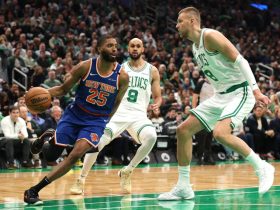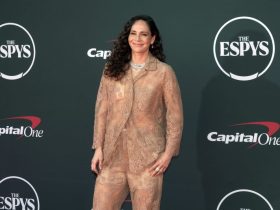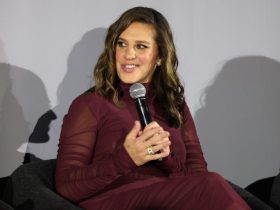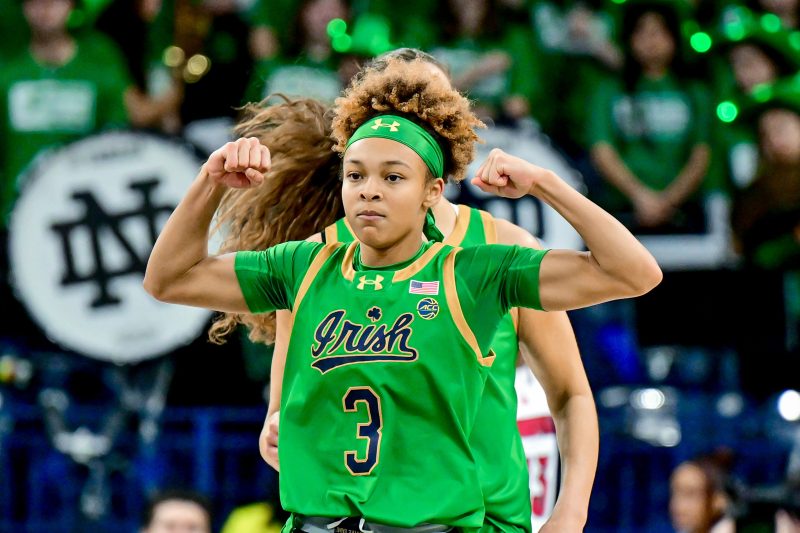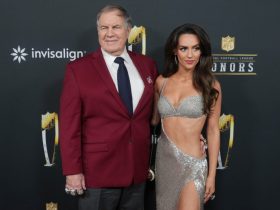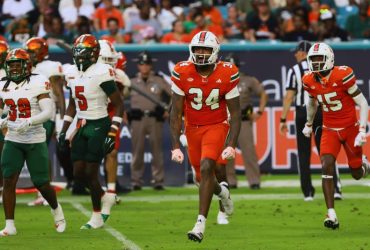Peyton Manning was legendary for his meticulous preparation as a player.
He spent countless extra hours at the training facility, working out and going over game plans and scouting reports with the coaching staff. When he left, it was for more of the same.
‘All the extra film study and all the extra prep – I think people know I was wired that way,’ Manning told USA TODAY Sports. ‘I had this great film room in my house in Indianapolis. I would go down there and watch film from 12 at night to 2 a.m.
‘To have that documented would have been cool.’
That sentiment is the driving force behind the second season of “Full Court Press,” the four-part docuseries by Manning’s Omaha Productions that follows USC’s Kiki Iriafen, LSU’s Flau’jae Johnson and Notre Dame’sHannah Hidalgo through the most recent college basketball season. The last two episodes of ‘Full Court Press’ air Sunday night on ESPN2.
Yes, Manning and ESPN are capitalizing on the explosion of interest in women’s basketball. But Manning is fascinated by how elite athletes do their jobs, and he’s bet others will be, too.
‘We just want to be a fly on the wall,’ Manning said. ‘Get behind the ropes, show their work ethic and not be distraction.’
Just as in the first season of ‘Full Court Press,’ which featured Caitlin Clark, Kamilla Cardoso and Kiki Rice, the Omaha Productions crew was given unprecedented access. It was allowed to film practices and be in the locker room before, during and after games – win or lose. There are extensive interviews with Iriafen, Johnson and Hidalgo, their coaches and their families, and the players all let the crew shadow them off-the-court, as well.
Manning said they were intentional about the athletes featured, wanting to have players from different parts of the country, different conferences and at different points in their careers. (Iriafen is a graduate student, Johnson a junior and Hidalgo a sophomore).
‘Our studies have shown people find these follow documentaries more interesting when you have three people and can see the different ways they operate,’ said Manning, who has used a similar format with Omaha and Netflix’s ‘Quarterback’ series.
But what makes ‘Full Court Press’ work is that it centers these women as athletes.
Too often, coverage of women athletes has focused on the aspirational and shied away from what makes sports so compelling. The drive. The work. The sacrifice. The grit. But ‘Full Court Press’ embraces and celebrates it.
‘Hannah Hidalgo, Kiki Iriafen, Flau’jae Johnson – these are women that play for legacy. That are unapologetic. That are badass hoopers,’ ESPN commentator Chiney Ogwumike says in the first episode.
Much of that first episode was devoted to the punishing defense played by Iriafen, Johnson and Hidalgo. Yes, each one can and does score. But it’s how miserable they make life for their opponents that sets them apart, and the game footage emphasizes just how relentless they are.
Their competitiveness is also a recurring theme.
‘I’ve always hated losing more than I love winning,’ Hidalgo said, a sentiment reinforced by her mother telling the story of her daughter not speaking to anyone for four days after one loss in high school.
The last two episodes focus on the end of the season, including USC’s intense rivalry with UCLA, Notre Dame’s collapse and the leg injury that kept Johnson out of the SEC tournament. There are searching questions and moments of doubt, and ‘Full Court Press’ doesn’t sugar coat that.
‘The thing that will always make me smile is her work ethic. Flau’jae will work. Sometimes she works too much,’ LSU coach Kim Mulkey says in episode three. ‘It concerns me because you can wear yourself out.’
There are light-hearted moments, too, like Johnson’s tour of Mulkey’s closet filled with her gaudy, game-day outfits, and Iriafen and her grad school classmates trying to flip quarters off their elbows. But Manning knows better than anyone what it takes to get, and stay, at the top of your game, and the main purpose of ‘Full Court Press’ is to give us mere mortals a glimpse of it.
Manning said when he first asked Patrick Mahomes to do the first season of ‘Quarterback,’ Mahomes was hesitant, uncertain if he wanted to open himself up like that. He asked whether Manning would have done a series like that when he was playing, and Manning said probably not, because he couldn’t imagine who would have been making it.
‘But if it was somebody I knew, who’d played the game and was all in on the work ethic and the extra work and was extremely passionate about it, then maybe so,’ Manning said.
He can be that person, especially knowing what he knows now.
‘I said to Flau’jae, your grandkids are going to want to know what you used to do, how you went about it,’ Manning said. ‘Hopefully we can show that.’

